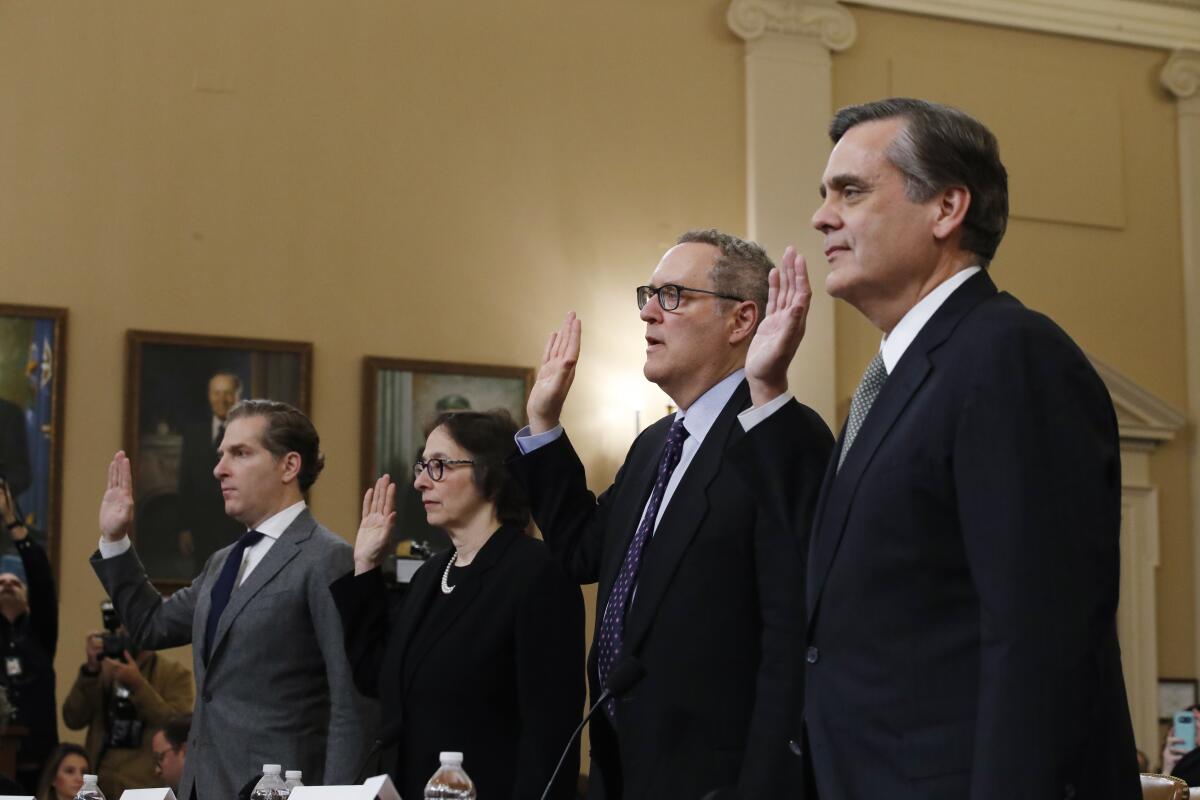Editorial: Impeachment hearing just gave us a Constitution lesson. Will the GOP bother to learn it?

Since the hearings began in earnest three weeks ago, Republicans in the U.S. House of Representatives have argued over and over that President Trump’s behavior in asking Ukraine to investigate former Vice President Joe Biden falls short of justifying the extreme sanction of impeachment.
On Wednesday, three law professors who testified before the House Judiciary Committee effectively dismantled that defense, arguing persuasively that the framers of the Constitution intended impeachment as a curb on exactly that sort of abuse of power.
Although the professors’ testimony on constitutional law and history was less dramatic than the factual accounts provided by a series of witnesses before the House Intelligence Committee, it was nevertheless important. Despite the fact that three presidents (including Trump) have been subjected to impeachment investigations in the last 45 years, the public understandably remains confused about the purpose of impeachment and the offenses for which a president can reasonably be put on trial by the Senate. That confusion makes it easier for Trump’s defenders to argue that the Democrats who launched this investigation are motivated purely by politics.
Article II of the Constitution says that the president and other officials can be impeached and removed from office for “treason, bribery, or other high crimes and misdemeanors.” Three of Tuesday’s witnesses — the ones who had been called by the Democrats — made a powerful case that Trump had committed offenses that would be deemed impeachable by the founders who wrote that constitutional restraint.
Professor Noah Feldman of Harvard Law School told the committee that Trump’s request that Ukraine investigate Biden, a prospective 2020 opponent, “constitutes a corrupt abuse of the power of the presidency.” Quoting William Richardson Davie, a delegate to the Constitutional Convention of 1787, Feldman said Trump’s request embodies the framers’ central worry that a sitting president would “spare no efforts or means whatever to get himself reelected.”
Professor Pamela Karlan of Stanford Law School emphasized the framers’ fear of foreign involvement in American elections and said that, in asking Ukraine’s president to investigate Biden, Trump was soliciting foreign interference. “That is not politics as usual, at least not in the United States or any other mature democracy,” Karlan said. “It is, instead, a cardinal reason why the Constitution contains an impeachment power.”
Professor Michael Gerhardt of the University of North Carolina Law School noted that Alexander Hamilton in the Federalist Papers wrote that impeachable offenses were those “which proceed from the misconduct of public men, or, in other words, the abuse or violation of some public trust.” Referring not only to Trump’s actions regarding Ukraine but to his efforts to thwart special counsel Robert S. Mueller III’s investigation and his refusal to provide information sought by Congress, Gerhardt concluded that Trump’s misconduct was “worse than the misconduct of any prior president, including what previous presidents who faced impeachment have done or been accused of doing.”
The fourth expert was professor Jonathan Turley of George Washington University Law School. Turley, who was called by committee Republicans, complained that House Democrats were rushing toward an “exceptionally narrow impeachment resting on the thinnest possible evidentiary record.” But even he conceded that “a quid pro quo to force the investigation of a political rival in exchange for military aid can be impeachable, if proven.”
Turley also agreed with other scholars that “it is possible to impeach a president for noncriminal acts.” He noted, however, that Presidents Nixon and Clinton were accused in articles of impeachment of committing crimes and suggested that impeaching a president solely on grounds of misconduct that wasn’t criminal would be a mistake.
We disagree. A president can commit an egregious abuse of power without violating a criminal statute. And the inclusion of “bribery” among the “high crimes and misdemeanors” justifying impeachment isn’t a reference to bribery as defined in federal criminal law. As Karlan noted, “bribery” in the impeachment clause refers to any situation in which an official “solicited, received or offered a person a favor or benefit to influence official action — that is, putting his private welfare above the national interest.” That is precisely what Trump is accused of doing in withholding congressionally approved aid to Ukraine in order to extract a political “favor” for himself from the Ukrainian president.
Finally, if there are gaps in what Turley called the “evidentiary record,” Trump has only himself to blame. Potentially crucial witnesses such as acting White House Chief of Staff Mick Mulvaney and former national security advisor John Bolton presumably would testify if Trump withdrew his unreasonable directive that they not cooperate with the investigation. (The president said this week that he might direct senior administration officials to testify at a Senate impeachment trial because it would be fairer than the House process.)
The law professors provided Congress with an important lesson in constitutional law and history on Wednesday. The problem is that most if not all Republicans in the House and the Senate seem unwilling to learn it.
More to Read
A cure for the common opinion
Get thought-provoking perspectives with our weekly newsletter.
You may occasionally receive promotional content from the Los Angeles Times.










